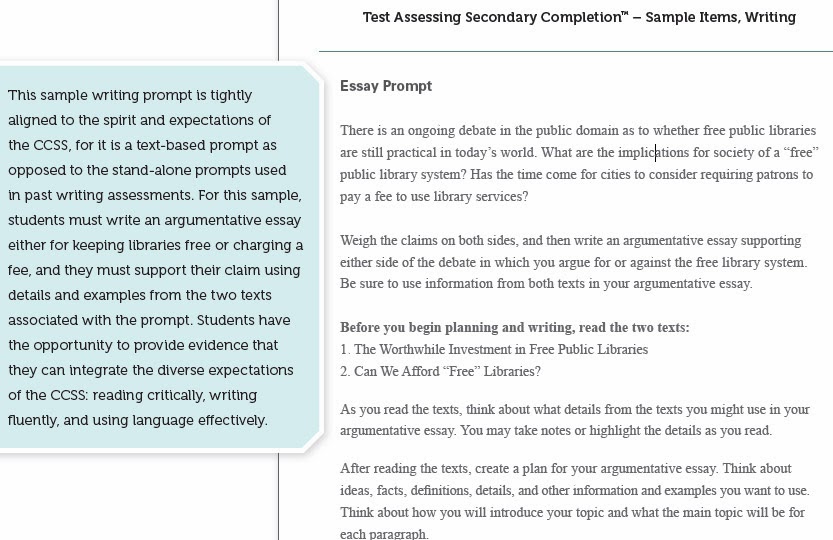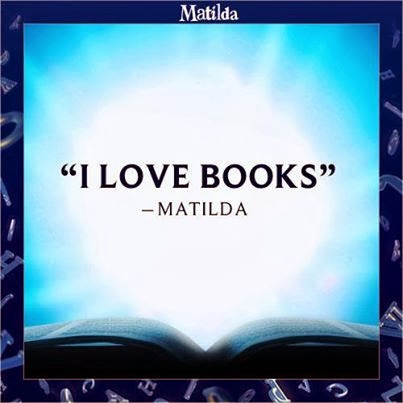| Image may be NSFW. Clik here to view.  |
| One of the four young actresses playing Matilda in the musical on Broadway. Matlida loves her library books! |
Amazing?
It’s true, although it might be said as well that is also about the broader paradigm of those with power taking advantage of the powerless.
The show is Matilda, a musical based on the children’s novel of the same name by Roald Dahl, made into a film in 1996.
While the subject may, indeed, be child abuse, it is tackled presenting the kind of world you find in fairy tales, with reviled villains broadly expressed, their conspicuously awful traits laid on thickly with can-you-top-this imaginativeness. It allows you to relish pinnacles of awfulness while resting safely assured the tale must be in the realm of fiction. Although it's highly entertaining fare for adults, it is children’s satire that employs a sort of reverse-logic humor to have its 'nasty' fun. The wickedly base adults of the plot do the opposite of the mature conduct that one stereotypically expects from grownups charged with responsibly raising children.
An example of some of the extreme absurdity central to the plot: The bad adults hate library books! There is one scene where the horrid father of the young heroine Matilda delights in throwing away library books, tossing them in high arcs through the air, one after another, into a rubbish bin and another where that father ferociously dives into a tearing attack on a poor defenseless book to destroy it. The book actually stands up pretty well in the battle. These `adults' of this strange world are outraged that others would want to read books!
| Image may be NSFW. Clik here to view.  |
| Mr. Woomwood, Matilda's father- a riled attack on a book |
. . . . In the very same American city where Matilda is playing on Broadway with the theme of destruction and hatred of library books being key to characterizing the plot’s travesties, just blocks away in a building on 42nd Street there are people who in real life have an inordinate amount of power and control, who are, in truth, plotting to get rid of books and libraries that house them. The funding of libraries is being stymied and at the same time diverted into real estate boondoggles that won’t benefit the public. These real life people are actually like Ms. Trunchbull, the cruel school headmistress of the Matilda story: They are in similarly charge with positions of trust and responsibility . . . they will actually be able to make the books, libraries, and librarians disappear. . if they are not stopped. They are people like New York Public Library trustee Stephen A. Schwarzman, head of the Blackstone Group, the world’s largest real estate investment firm which has multiple other side enterprises like hedge funds.
Amazing?
You don’t believe me about Matilda’s plot? That it’s about child abuse? Or that the adults in the plot are caricatured as so dastardly that they would be fixated on throwing away library books? The good news is that the musical has a happy, if tricky and unusual, surprise ending which makes it, in the end, about conquering oppression and the resources it takes to liberate oneself.
| Image may be NSFW. Clik here to view.  |
| Ms. Trunchbull with her tongue out as a non-fan of books. Ms. Honey, teacher and friend to Matilda, is aghast. |
Here is some description of the show from New York Times review when the musical opened last spring.
Rush now, barricade stormers of culture, to the Shubert Theater, and join the insurrection against tyranny, television, illiteracy, unjust punishment and impoverished imaginations, led by a 5-year-old La Pasionaria with a poker face and an off-the-charts I.Q.(See: Theater Review- Children of the World, Unite! ‘Matilda the Musical’ at Shubert Theater, by Ben Brantley, April 11, 2013.)
* * *
Above all it’s an exhilarating tale of empowerment, as told from the perspective of the most powerless group of all. I mean little children.
* * *
The printed word is regarded in the Wormwood household [Matilda’s home] as kiddie pornography might be looked upon in others.
| Image may be NSFW. Clik here to view.  |
| Above, Leslie Margerita as Mrs. Wormwood, Matilda's mother, from one of the videos ,"looks not books," promoting the show. |
. . . The motto might as well also be the motto of those generating the designs for what we will supposed to be getting in place of real libraries in the future.
| Image may be NSFW. Clik here to view.  |
| "Looks Not Books" again? On left the proposed design for the tiny shrunken Donnell "replacement library." On the right the design of the bookless library that design was apparently taken from. |
Not that long ago, before Mayor Bloomberg had taken over from Mayor Giuliani, the flagship, destination libraries of Manhattan had on the order of 13 million books in them to be readily available to city readers. Now as Bloomberg has just left office those running the libraries are busy reducing that number way down to around only 4 million books, perhaps closer to 3.5 million.
| Image may be NSFW. Clik here to view.  |
| From 1987 to an envisioned 2015 (with an implemented Central Library Plan), how total number of books in Manhattan's principal libraries is declining drastically. Over 12 million books in 1996 and 2003 to perhaps 4.2 million books (or even far fewer?) when CLP is implemented. Starting figures in the graph for 1987 and 1992 are graphed lower than than they actually should be because they don't include unknown numbers for Mid-Manhattan and Donnell |
. . . The beloved Donnell Library on 53rd Street across from MoMA was suddenly and secretively sold off for a pittance, not yet replaced, to shrink it down to less than a third of its previous size, in space that will be mostly subterranean and largely bookless. Having so far gotten away with this affront to library lovers, the same perverse crew running libraries is pursuing something called the “Central Library Plan” that sells off Mid-Manhattan, the recently completed Science, Industry and Business library, and plunders the research stacks of the Central Reference Library, getting rid of and exiling the research books kept there, reducing all this space to about one quarter the amount of library space that existed before.
| Image may be NSFW. Clik here to view.  |
| From an earlier NNY Article- 1987 to an envisioned 2015 (with an implemented Central Library Plan), total actual midtown Manhattan Library destination space actual and planned, first going up and then going lower than ever before |
The bad adults in Matlida are characterized by mendacity and lying. They use deceit to surreptitiously appropriate from others what does not belong to them. Though the Central Library Plan would reduce more than 380,000 square feet of library space down to just 80,000 square feet, those selling off and reducing all this library space have the effrontery to be representing the reduction as an expansion. See: Saturday, July 13, 2013, Deceptive Representations By New York Public Library On Its Central Library Plan: We’re NOT Shrinking Library Space, We Are Making MORE Library Space!
| Image may be NSFW. Clik here to view.  |
| A scene of a destroyed English library in Matilda? No, a photo in a warning Tweet from Library Lovers League about pending destruction in the New York City library system. |
Below are two videos from the rally held outside the gala to protest this absurdity.
Carolyn E. McIntyre, Citizens Defending Libraries Rally, 4 November 2013
Citizens Defending Libraries Rally, New York Public Library, 4 November 2013
The “Central Library Plan” has not found favor with the public so the NYPL has deceptively tried changing its name to the “42 Street Library Renovation,” (“It's the same plan,”says NYPL COO David Offensend), and most recently, even more abstrusely referring to a “renovated central branch library,” in a bit of trickiness whereby the NYPL attempted to fool people into unknowingly supporting the unpopular plan.
| Image may be NSFW. Clik here to view.  |
| Matilda's library set- full of books |
| Image may be NSFW. Clik here to view. |
| In contrast, empty shelves in the Brooklyn Heights Library. More pictures of the empty library shelves around the city compared to the way we conceptually believe library shelves should be filled are here in this article. |
| Image may be NSFW. Clik here to view.  |
| The shelves of Matilda's library refuge are full of books |
an airy wonderland of large letter-bearing tiles and bookcases. It suggests the endless supply from which Matilda (and vicariously we) can draw to make words, which make sentences, which make stories.Because, as Brantley discerns, the story celebrates a wellspring of available empowerment:
"Matilda," you see, is about words and language, books and stories, and their incalculable worth as weapons of defense, attack and survival. It's about turning the alphabet into magic, and using it to rule the world.
| Image may be NSFW. Clik here to view.  |
| One of the show's Facebook promotions referencing the "Telly" song |
Somewhere on a show I heard, that a picture tells a thousand words, so telly, if you bother to take a look. is the equivalent of like, . . . lots of books!Library administration officials aren’t exactly promoting television screens to replace books, but as books take up real estate and thus entail keeping the libraries, they are promoting the idea that books be replaced with computer screens despite public preference for physical books and recent reviews of scientific literature suggesting that the human brain is hardwired to learn and remember better when reading physical books.
All I know, I learned from telly, this big beautiful box of facts.
. . . all you need to make you wise is twenty-three minutes plus advertisements.
. . . The bigger the telly, the smarter the man.. . You can tell from my big telly just what a very clever fellow I am.
. . . all you need to fill your noggin without really having to think or nothing.
| Image may be NSFW. Clik here to view.  |
| Mr. Tony Marx Wormwood? Is Photoshop all it takes to imagine NYPL President Tony Marx as Mr. Wormwood? Mr Marx was hired and is very well paid to promote the NYPL's plans to eliminate books and libraries as `populism' (like the Telly?) NOT discriminatory and antidemocratic. |
| Image may be NSFW. Clik here to view.  |
| Promotion for the musical's satire |
People don't like smarty pantsDo I need to express that the song repeats the word “loud” many times and LOUDLY?
What go round claiming
That they know stuff
We don't know.
Now, here's a tip.
What you know matters less
Than the volume with which
What you don't know's expressed!
Content, has never been less important.
So you have got to be ...
Loud!
(Loud, loud, loud)
Did you know that new York City library administration officials are now touting the idea that libraries should be “loud” (with a `non-shush' policy) so that they can be smaller spaces where everything “flexibly” happens pell-mell on top of everything else. So with the opening of Mariners Harbor, the NYPL’s most recently designed library, we learn that it is supposed to be NOISY!:“`We encourage noise,’ said Elizabete Pata, the library manager. `I’m not the typical librarian, shushing people.’”
Might that drive away an earnest, contemplative, book-reading child like Matilda? Might that, in fact, be the point?
In the show’s second act Ms. Trunchbull in her supervillain musical number unveils her vision of the world (“scarier than any spook house,” according to Brantley), a world without children:
Imagine a world with no children.Absurd for a school mistress? But in well-to-do New York City we have been substantially cutting back on the very small amounts required to fund libraries when usage is up 40% programatically and 59% in terms of circulation. And then, as noted, the NYPL trustees specially honor Bloomberg for cutting that funding! Shouldn’t we suspect that the intent is to drive away the patrons? All the better to sell the real estate? In the future, those who were library users can just sit at home downloading to smart phones, leaving the developers to access their real estate in “peace and quiet.”
Close your eyes and just dream.
Imagine – come on, try it –
The peace and the quiet.
A burbling stream.
The odious adults in Matilda are all self-obsessed, arrogant, and self-congratulatory. Matilda's parents hardly notice her, except occasionally as a nuisance.
Agatha Truchbull’s expressed-in-Latin credo?: “Bambinatum est maggitum”- “Children are maggots.”
| Image may be NSFW. Clik here to view.  |
| Above Stephen A. Schwrzman, NYPL Trustee and Blackstone Group Head, as Agantha Trunchbull. Is Mr. Schwarzaman a real life version of Ms. Trunchbull? |
| Image may be NSFW. Clik here to view.  |
| From the pen of Simon Verity- mournful, if fantastical contemplation of some real life fears for New Yorkers loving libraries |
| Image may be NSFW. Clik here to view.  |
| Kick Matilda out of her book-filled library?- Tell her she can only come back if here parents give her money to pay to get in? |
Yes it is amazing, but. . .
. . . Amazing doesn’t make it any less true or unfortunate- Also, as children in Ms. Trunchbull’s school find out when offered ghastly either/or choices: When the children succeed beyond expectation in surmounting one shocking challenge, it's best they be prepared to learn that Ms. Trunchbull still has in store for them the other more dreaded choice.
Here is the story about those essays. Even as our schools are themselves being increasingly privatized in various ways and increasingly become corporately-sponsored, corporately-massaged environments with teaching-to-the-test regimes that starve intellectual curiosity and passion, focusing perhaps too much on churning out credentialed graduates certified that slot easily into that kind of business environment, suggestions are being made in ways you might never guess respecting how our values perhaps ought to shift. Are we really supposed to be thinking in terms of selling off everything that is public and with privatization let the private sector take charge of everything that used to be publicly handled?
You remember the 71-year-old tradition of the GED, the high school equivalency diplomas with GED standing for “General Educational Development”? The exam is being privatized with McGraw-Hill a for-profit education company taking over.
Would you as a young ungraduated person like to prepare for McGraw-Hill’s new replacement test, the TASC (Test Assessing Secondary Completion), by taking on one of their practice questions?--- Maybe, if you have been forced to think about completing your high school education with this substitute you are particularly reliant on libraries and self-education— Well, that’s how you will wind up answering the McGraw-Hill essay question that suggests that the public libraries, like this school testing, should be taken over by the private sector. Because, doesn’t the private sector know best how to deliver the message that public assets don’t have value?
| Image may be NSFW. Clik here to view.  |
| McGraw-Hill essay prompt: "There is an ongoing debate . . . whether free public libraries are still practical in today’s world." |
Here is McGraw-Hill’s “essay prompt”:
There is an ongoing debate in the public domain as to whether free public libraries are still practical in today’s world. What are the implications for society of a “free”public library system? Has the time come for cities to consider requiring patrons to pay a fee to use library services?There is an ongoing debate about keeping libraries? It’s going on “in the public domain”?
| Image may be NSFW. Clik here to view.  |
| Promotion for the musical |
It’s time to fight back, not just be `amazed.'
Meanwhile, until there is a new musical based directly on the conniving in New York with respect to libraries, you can get a good dose of satiric relief by going to see Matilda, which has parodic fun with some closely analogous situations where fiction vies to be as strange as the truth.
| Image may be NSFW. Clik here to view.  |
| Promotion for the show. You'd be surprised what little can do a lot. Support the campaign. |
I cannot bring this article to a conclusion without a very personal note in memoriam for a comrade in life.
| Image may be NSFW. Clik here to view.  |
| Randy- A helluva guy |
. . Odd thing: For all the time I talked with him, Randy never mentioned to me how much the plot of show Matilda was about libraries, although he knew about my campaign as a co-founder of Citizens Defending Libraries to save New York City’s libraries from being sold to real estate developers and he’d signed our petition to help the cause. Randy never suggested to me about how observing these parallels might help the cause- or I didn't pick up on it. I think he must have been preoccupied with his health. Sometimes we need to think about other things and we had so much to talk about concerning all the other things that were good in life.
| Image may be NSFW. Clik here to view.  |
| One of the pictures posted by a friend imagining a musical at the Schubert about Randy who worked there |
